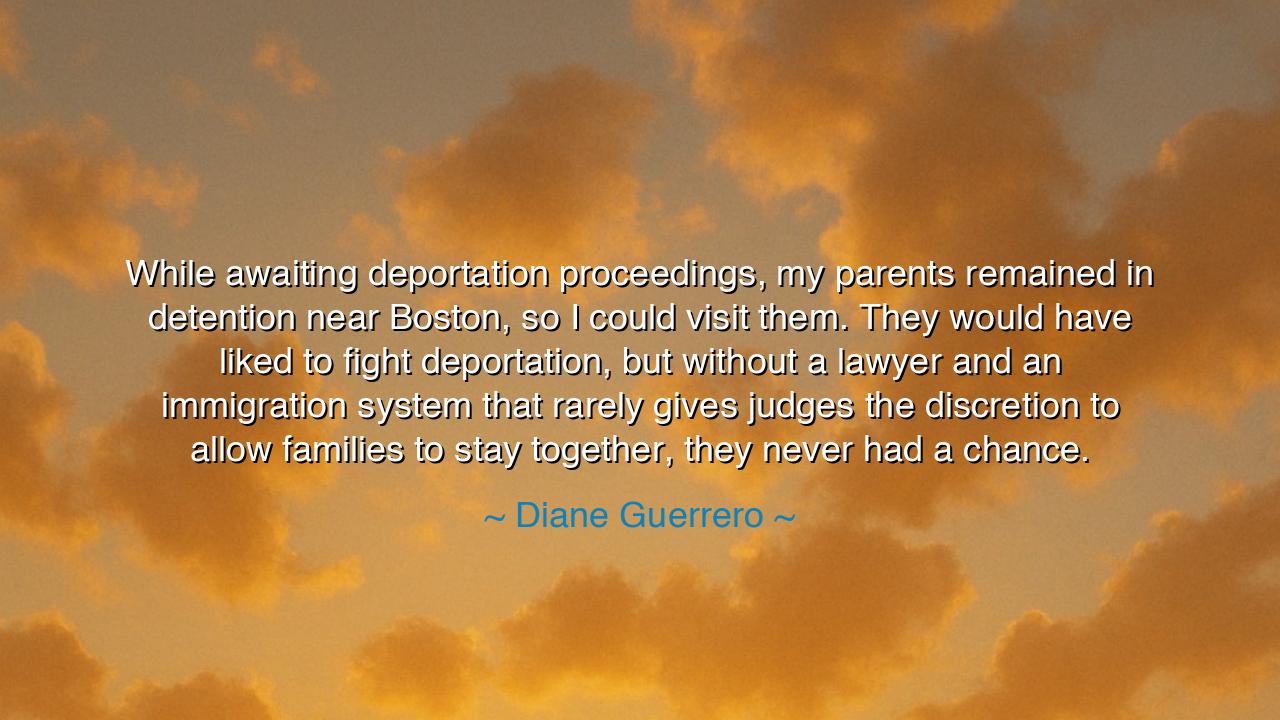
While awaiting deportation proceedings, my parents remained in
While awaiting deportation proceedings, my parents remained in detention near Boston, so I could visit them. They would have liked to fight deportation, but without a lawyer and an immigration system that rarely gives judges the discretion to allow families to stay together, they never had a chance.






In the vast sweep of history, one of the most profound struggles that individuals and families face is the challenge of separation—whether from family, home, or identity. The words of Diane Guerrero, in her heart-wrenching reflection on her parents' detention, speak not just of her personal experience but of a universal truth: "While awaiting deportation proceedings, my parents remained in detention near Boston, so I could visit them. They would have liked to fight deportation, but without a lawyer and an immigration system that rarely gives judges the discretion to allow families to stay together, they never had a chance." In these words, we hear the echo of countless individuals torn from their loved ones, caught in the merciless gears of a system that often fails to recognize the humanity of those it seeks to control.
The ancients understood well the power of family—that sacred bond between parent and child, which forms the very foundation of society. Homer's Iliad tells of Achilles' grief at the loss of his closest companion, Patroclus, a bond of friendship and familial affection that transcended even the battlefield. It is this connection, this love, that sustains us in our darkest hours. When separated, especially by forces beyond our control, we are left in a profound state of suffering. Guerrero’s words cut to the heart of this truth, showing us that the detention of her parents was not just a political act but a personal tragedy, one that left a permanent mark on her soul and on the very fabric of her family.
In ancient Rome, the concept of family was sacred. The paterfamilias, the head of the household, had the authority to protect the family, and it was said that the family's welfare was the most important concern of society. But even then, the laws of the state often threatened to tear families apart. The poet Virgil in his epic, the Aeneid, shows us the plight of Aeneas, who must leave his homeland and loved ones to fulfill a greater destiny. Yet, this forced separation is not portrayed as honorable; it is a tragic event that haunts him throughout his journey. Similarly, Guerrero’s story speaks of a tragic fate, where the state’s immigration laws become the barrier to her family’s unity. The law, instead of serving the family as it should, becomes a force of separation.
In the story of Socrates, we find another reflection of the cost of separation. Socrates, sentenced to death for challenging the Athenian system, was separated from his family and his community. But rather than be broken by this, he chose to face his fate with dignity, demonstrating that one’s sense of self and justice cannot be diminished by separation. Guerrero, too, chooses to stand strong, even in the face of a system that seems indifferent to the human cost of its actions. The separation from her parents, the deportation proceedings, represent a profound injustice—an injustice that not only tears at the heart of the individual but also erodes the very fabric of family and community.
The wisdom of the ancients teaches us that systems, be they governmental or societal, are meant to protect the unity of families, not tear them apart. Justice, in its highest form, is not about adhering to laws that serve the powerful but about recognizing the humanity of each individual, especially the most vulnerable. Guerrero’s words remind us of the failure of the immigration system, a system that lacks the compassion and flexibility necessary to uphold the sacredness of family. A judge who lacks the discretion to allow families to stay together, even when it is in their best interest, is a judge who fails to recognize the very heart of justice—the preservation of human dignity.
The lesson from Diane Guerrero’s poignant words is clear: we must always place humanity at the center of the systems that govern our lives. Laws and policies should serve the people, not the other way around. Just as Homer’s heroes fought for the honor of their families, we must fight for the protection of the family unit, ensuring that those in power do not use laws as tools of separation, but as instruments of unity and justice. Guerrero teaches us that to fight for one’s family is a sacred duty, and that when systems fail, we must rise to challenge them, not with bitterness, but with the resolve to create a world where the separation of families is not seen as inevitable, but as unacceptable.
As we reflect on Guerrero’s words, let us remember that the true test of a society is how it treats its most vulnerable—how it treats the family at the heart of each community. Legal systems and policies should serve to protect and nurture, not to divide. Let us take up the mantle of justice, not in the blind adherence to systems, but in the pursuit of compassion and unity. Let us ensure that the separation of families becomes a thing of the past, and that in every law and in every decision, the heart of the family remains intact. In this, we will honor the very essence of justice and human dignity, as the ancients did, and as we must continue to do for generations to come.






AAdministratorAdministrator
Welcome, honored guests. Please leave a comment, we will respond soon